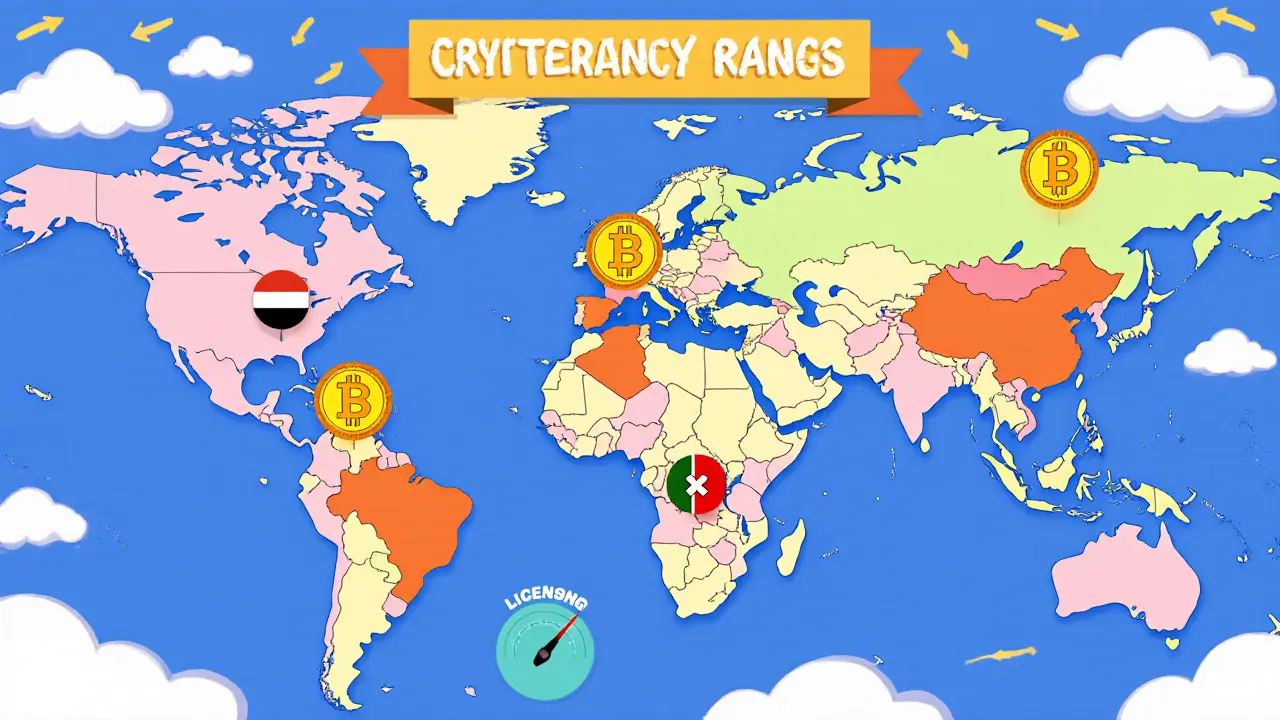Crypto Trading Jurisdiction Selector
Find Your Best Crypto Trading Country
Select your top priorities to discover which jurisdiction aligns best with your trading needs.
Your Priorities
Recommended Jurisdiction
Select your priorities to see your recommended country.
Comparison Overview
See how the top jurisdictions compare across key metrics.
| Countries | Regulatory Clarity | Personal Tax | Corporate Tax | License Time | Infrastructure |
|---|---|---|---|---|---|
| Switzerland | 88 | 0% (private) | 12-15% | 2-3 months | 99.9% |
| UAE | 92 | 0% | 0% | 1-2 months | 99.8% |
| Singapore | 85 | 0% | 17% (with incentives) | 3-6 months | 99.99% |
| Portugal | 80 | 0% | 21% | 2-3 months | 99.7% |
| US (Wyoming) | 78 | 0-37% | 21% (state 0-6%) | 4-9 months | 99.6% |
Key Takeaways
- Switzerland, the UAE, Singapore and Portugal lead the rankings for low tax, clear rules and robust infrastructure.
- Regulatory clarity scores are highest in the UAE (VARA) and Switzerland (DLT Act).
- Personal crypto gains are tax‑free in Portugal and the UAE, while Switzerland caps capital‑gains tax at 0% for private holders.
- Licensing speed varies - the UAE can approve a crypto‑exchange licence in under two months, Singapore takes 3‑6 months, and the EU averages 6‑12 months.
- Banking integration is strongest in Switzerland, where 68% of crypto firms have a local bank relationship.
When you plan to trade crypto at scale, the country you call home matters as much as the platform you use. A friendly regulator, zero or low tax on gains, and reliable internet links can turn a profitable hobby into a thriving business. This guide walks through the best countries for crypto trading in 2025, compares the most relevant factors, and gives you a step‑by‑step checklist to pick the right jurisdiction for your needs.
What Makes a Crypto Trading Jurisdiction "Best"?
Three pillars define a top crypto‑trading jurisdiction:
- Regulatory clarity - clear rules, fast licensing, and a dedicated regulator.
- Tax efficiency - low or zero tax on personal gains and reasonable corporate rates for businesses.
- Infrastructure & banking - high‑speed internet, stable exchange uptime, and access to crypto‑friendly banks.
We rate each country across these dimensions using data from Chainalysis, Sumsub, CoinGecko and local regulator reports.
Ranking the Top Crypto Trading Countries in 2025
Below are the five jurisdictions that consistently score highest on all three pillars.
Switzerland is a federal state that introduced the DLT Act in 2021, giving blockchain projects a solid legal backbone. The Swiss Financial Market Supervisory Authority (FINMA) enforces strict asset segregation, protecting traders if a firm goes bankrupt. Private crypto holders enjoy 0% capital‑gains tax, while professional traders fall under cantonal corporate tax rates of 12‑15%.
United Arab Emirates launched the Virtual Assets Regulatory Authority (VARA) in 2022, creating the world’s first dedicated regulator for digital assets. Corporate and personal tax on crypto profits are both 0%, and a typical exchange licence is granted within 30‑45 days.
Singapore operates under the Monetary Authority of Singapore (MAS). There is no capital‑gains tax for individuals, and the Major Payment Institution licence is required for exchanges. Corporate tax is 17% but a slew of incentives lower the effective rate for qualifying crypto firms.
Portugal offers a straightforward tax regime: crypto gains are completely tax‑free for individuals. The country’s Golden Visa program lets investors obtain residency with a €500,000 real‑estate investment, though processing can take 18‑24 months.
United States (Wyoming) remains a strong contender for institutional traders. While the IRS treats crypto as property (subject to capital‑gains tax), Wyoming has passed over 20 blockchain‑friendly statutes, offering a crypto‑specific bank charter and a clear path to licences.

Side‑by‑Side Comparison Table
| Country | Regulatory Clarity Score (out of 100) | Personal Crypto Tax | Corporate Tax Rate | License Approval Time | Exchange Uptime (99.x%) | Banking Access (%) |
|---|---|---|---|---|---|---|
| Switzerland | 88 | 0% (private holders) | 12‑15% | 2‑3 months | 99.9 | 68 |
| UAE | 92 | 0% | 0% | 1‑2 months | 99.8 | 55 |
| Singapore | 85 | 0% | 17% (with incentives) | 3‑6 months | 99.99 | 48 |
| Portugal | 80 | 0% | 21% | 2‑3 months (Golden Visa) | 99.7 | 42 |
| United States (Wyoming) | 78 | 0‑37% (depending on income) | 21% (state level 0‑6%) | 4‑9 months | 99.6 | 41 |
Deep Dive: What Each Pillar Means for You
Regulatory Clarity
The UAE’s VARA framework earned a 92/100 score in the Sumsub 2025 report, thanks to a single licensing portal and clearly defined activity categories. In Switzerland, FINMA’s guidance on DLT projects provides legal certainty but varies by canton - Zug (the “Crypto Valley”) offers the most trader‑friendly tax treatment.
Tax Efficiency
Portugal’s zero‑tax policy for private crypto gains is a game‑changer for long‑term hodlers. Meanwhile, Singapore’s 17% corporate tax can be reduced to below 10% through the Innovation Development Tax Incentive, making it attractive for exchange startups that need a reputable hub.
Infrastructure & Banking
According to CoinGecko’s 2025 infrastructure report, Singapore’s data‑center network delivers an average API response time of 127 ms, the fastest among the top five. Switzerland’s banking ecosystem, featuring crypto‑specialist banks like Sygnum and SEBA, supports 68% of local firms, far ahead of the global average of 41%.

Practical Steps to Set Up in Your Chosen Jurisdiction
- Determine your primary goal - personal trading, professional trading, or running an exchange.
- Match the goal to the jurisdiction’s strengths (e.g., tax‑free personal gains → Portugal or UAE).
- Apply for the required licence:
- UAE: VARA exchange licence (minimum AED 1.2 M operational cost, AED 500 k insurance).
- Singapore: Major Payment Institution licence (SGD 1 M paid‑up capital).
- Switzerland: Cantonal banking licence (varies; Zug offers streamlined process for crypto firms).
- Secure residency if needed - Golden Visa in Portugal (€500 k real‑estate) or Investor Visa in the UAE (AED 750 k).
- Open a corporate bank account - prioritize banks with crypto‑friendly AML policies.
- Implement compliance tools (KYC, AML, travel‑rule) that align with the local regulator’s tech guidelines.
Checklist: Is This Country Right for Your Crypto Trading Business?
- Regulatory framework clearly defined and enforced?
- Zero or low tax on crypto gains for your entity type?
- License processing time fits your launch timeline?
- Reliable internet and exchange uptime >99.8%?
- Access to a crypto‑friendly bank with minimal paperwork?
- Cost of compliance (legal fees, insurance, capital requirements) within budget?
Future Outlook - What to Watch in 2026 and Beyond
Regulation is still evolving. The World Economic Forum predicts that by 2027, 65% of G20 nations will have comprehensive crypto frameworks. Keep an eye on Switzerland’s upcoming DAO provisions and Singapore’s Project Guardian DeFi rollout, both slated for late 2025. A shift in any of these could swing the advantage to another jurisdiction, so maintain a flexible corporate structure (e.g., a holding company in a low‑tax jurisdiction with subsidiaries in a high‑infrastructure hub).
Can I trade crypto as a US citizen while living in Portugal?
Yes. Portugal’s tax‑free regime applies to residents, and the country does not impose exit taxes on US citizens. You’ll still need to file US tax returns, reporting worldwide income, but crypto gains won’t be taxed by Portugal.
How long does a VARA licence take to obtain?
The UAE’s VARA reports an average approval time of 30‑45 days, provided you meet the AED 1.2 M operational budget and insurance requirements.
Is there banking access for crypto firms in Singapore?
Banking is improving; about 48% of crypto firms have a local banking relationship, thanks to banks like DBS and OCBC opening dedicated crypto desks.
What are the main tax differences between Switzerland and the UAE?
Switzerland taxes corporate profits at 12‑15% and applies cantonal variations for individuals. The UAE imposes 0% tax on both personal and corporate crypto income, making it cheaper for high‑volume traders.
Do I need a special licence to run a DeFi platform in these countries?
Regulators are still shaping DeFi rules. In the UAE, VARA classifies DeFi as a “virtual asset service” and requires a specific licence. Switzerland’s FINMA treats DAO‑based services under its DLT Act, while Singapore’s MAS is piloting a DeFi sandbox that may grant temporary licences.
Pick the jurisdiction that aligns with your tax goals, timeline, and tech needs, and you’ll be set to trade crypto efficiently in 2025 and beyond.

Benjamin Debrick
August 18, 2025 AT 18:36When one contemplates the tax efficiencies of the jurisdictions enumerated, the logical conclusion emerges that the United Arab Emirates, with its zero‑percent corporate and personal rates, represents a paradigmatic exemplar of fiscal minimalism; indeed, the Swiss model, while commendable for its regulatory precision, nevertheless imposes cantonal variations that may erode the ostensible advantage of a 0 % personal gains tax, thereby necessitating a nuanced assessment of net after‑tax returns, especially for high‑frequency traders whose profit margins are acutely sensitive to marginal tax differentials, and this calculus is further complicated by the disparate licensing timelines that, in the case of Singapore, extend up to six months, a duration that may prove prohibitive for market entrants seeking rapid deployment.
Anna Kammerer
August 22, 2025 AT 05:30Oh, absolutely, because navigating a “zero tax” regime is just a walk in the park-just remember you still have to file your U.S. tax return, and the IRS will love seeing your foreign crypto gains, even if Portugal or the UAE doesn’t bother to take a cut, so good luck with that delightful paperwork.
Mike GLENN
August 25, 2025 AT 16:25Choosing a jurisdiction for crypto trading is rarely a decision made on a single data point; it is an iterative process that weighs regulatory clarity, tax implications, and operational infrastructure in equal measure.
First, regulatory clarity provides the legal certainty that protects both the trader and the exchange from unforeseen compliance pitfalls, and in regions such as the UAE, the VARA framework delivers a streamlined licensing portal that cuts approval times to a mere month and a half.
Second, tax efficiency directly influences net profitability, especially for high‑volume traders whose turnover can dwarf the nominal licensing fees, and here the zero‑tax policies of Portugal and the United Arab Emirates become compelling incentives.
Third, infrastructure and banking access underpin day‑to‑day trading operations, because without reliable API response times and a bank willing to service crypto firms, even the most tax‑advantaged setup can crumble under operational strain.
The Swiss ecosystem, with its well‑established crypto‑friendly banks like SEBA and Sygnum, offers unparalleled banking connectivity, yet the cantonal tax nuances may introduce hidden costs that are not immediately apparent on the surface.
Conversely, Singapore’s data‑center network delivers sub‑150‑millisecond API latency, a metric that professional traders obsess over, though its corporate tax rate of 17 %-even after incentives-remains higher than the UAE’s nil rate.
When evaluating licensing timelines, one must also consider the ancillary costs associated with due‑diligence, insurance, and capital requirements, as the UAE’s AED 1.2 M operational budget and AED 500 k insurance provision can be substantial for startups.
Furthermore, residency requirements, such as Portugal’s Golden Visa or the UAE’s Investor Visa, add another layer of complexity, intertwining immigration law with tax residency status, which can affect the applicability of local tax treaties.
It is advisable to construct a flexible corporate structure, perhaps through a holding company in a low‑tax jurisdiction, while situating the operational entity in a hub with superior connectivity and banking services.
Such a dual‑entity approach can mitigate risk, optimize tax outcomes, and provide redundancy should regulatory landscapes shift, as predicted by the World Economic Forum’s 2027 outlook.
In practice, many traders adopt a phased migration strategy: first establishing a presence in a jurisdiction with rapid licensing, then gradually expanding to a secondary location that offers deeper banking relationships.
This staggered rollout reduces the initial regulatory burden while preserving the option to scale as business volume grows.
Finally, continuous monitoring of legislative developments is essential; the upcoming DAO provisions in Switzerland and the DeFi sandbox in Singapore could materially alter the competitive advantages of each jurisdiction.
By staying informed and maintaining an adaptable corporate framework, traders can ensure that they remain positioned to capitalize on the most favorable regulatory and fiscal environments, regardless of how the global crypto policy landscape evolves.
In summary, the optimal jurisdiction is the one that aligns with your specific trading volume, risk tolerance, and long‑term strategic goals.
Erik Shear
August 29, 2025 AT 03:19Both points are valid.
Tom Glynn
September 1, 2025 AT 14:14Great analysis! 🌟 Remember, the right jurisdiction is like finding the perfect coffee blend – you need the right balance of flavor, strength, and aroma ☕️🚀.
Johanna Hegewald
September 5, 2025 AT 01:08If you’re just starting, look at Portugal – no tax on personal crypto gains and the residency process is straightforward.
mike ballard
September 8, 2025 AT 12:03Indeed, Portugal’s tax‑free regime is a classic “low‑friction entry point” for retail hodlers, but be mindful of the AML/KYC scaffolding that banks still enforce – the compliance stack can get gritty fast 😅🔐.
Molly van der Schee
September 11, 2025 AT 22:58Don’t let the paperwork scare you; with the right guidance you’ll be trading in a tax‑friendly haven before you know it, and the future looks bright for crypto enthusiasts worldwide.
Mike Cristobal
September 15, 2025 AT 09:52It’s crucial to remember that tax evasion is unethical; while seeking low‑tax jurisdictions is smart, always stay transparent with authorities – integrity matters more than profit 🌍✊.
Scott McCalman
September 18, 2025 AT 20:47Hold onto your hats, folks, because the crypto landscape is about to explode into a regulatory fireworks show that will make or break fortunes overnight – the drama is just beginning! 🎆🔥
PRIYA KUMARI
September 22, 2025 AT 07:41Your melodramatic hype masks the harsh reality that most traders are ill‑prepared for the compliance gauntlet, and the so‑called “fireworks” will simply burn those who ignore proper licensing and tax obligations.